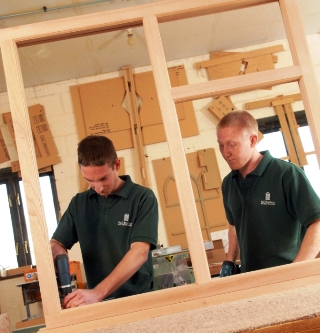Dave Campbell – Marketing & Training Manager, British Woodworking Federation
It has recently been claimed that design and technology is being “marginalised” in schools to a point at which, in as little as five years, it may no longer exist in school curriculum. Reports suggested this could cut the lifeblood of skills and newcomers to related industries and remove the UK’s competitive edge as countries like China start to invest in design and technology in schools.
The BWF was invited onto LBC Radio just before Christmas to comment on this story as a trade association that has long highlighted the dangers of a skills gap in the woodworking industry – an industry that has typically attracted new generations inspired by design and technology lessons at school.
 Woodworking alone accounted for more than £3.8bn in revenue last year, and represents about 7% of the UK’s construction workforce of 2.9 million. To meet the demand in the UK for the wood trades, the Construction Industry Training Board (CITB) puts the net increase needed in labour at 4,260 workers every year for the next four years (a rise from 244,700 in 2014 to 260,860 in 2018).
Woodworking alone accounted for more than £3.8bn in revenue last year, and represents about 7% of the UK’s construction workforce of 2.9 million. To meet the demand in the UK for the wood trades, the Construction Industry Training Board (CITB) puts the net increase needed in labour at 4,260 workers every year for the next four years (a rise from 244,700 in 2014 to 260,860 in 2018).
Woodworking and joinery manufacturing can offer a hugely rewarding career as an area of continuous innovation, particularly with sustainable materials, like timber, so high on the agenda. From high-end production engineering to bespoke joinery, working for big brands or even offering the potential to create new businesses, as a career woodworking offers a wide range of opportunities. Recent analysis from the UK Commission for Employment and Skills placed carpenters and joiners among the 40 top jobs of the future.
Yet, inadequate careers advice for school pupils and a failure to invest in vocational subjects at schools mean our woodworking and wider construction industries are seeing a shortfall in new home-grown personnel.
Particularly, in schools, we are seeing a shift in careers advice to broadly favour academic-driven careers through university study, rather than exploring the wide options provided by careers delivered through vocational training and apprenticeships.
A significant cause of this – and an issue that is becoming increasingly apparent – are the different and non-complementary paths being taken by the Department for Business, Innovation and Skills (BIS) and the Department for Education (DfE).
Whereas BIS is increasing investment in skilled apprenticeships and STEM (science, technology, engineering and mathematics) subjects at universities, the Department for Education appears to be pulling away curriculum and careers advice that supports these areas earlier in the education system.
A similar issue is happening around the government’s housing and infrastructure policies which are driving demand for the construction industries in the face of declining investment in the workforce needed to deliver these projects. In fact, UK Manufacturing has traditionally provided 90% of construction products used domestically, contributing to the country’s economic growth and employment figures. But in the past five years we have seen a significant increase in imports and many longstanding UK firms going out of business.
If we continue to fail to invest in the woodworking and other construction industries in the UK, we risk losing not only our competitive edge in these industries globally in what should be an area of growth for the UK economy, but also losing our ability as a nation to meet the demands of our own policies and indirectly investing in the growth of other countries’ economies as we look outside of the UK.
We need more investment and commitment for our home-grown talent and industries to support sustainable growth in the UK. Overhauling careers advice to deliver a thorough picture of careers so school leavers can make informed decisions, and a renewed investment in vocational subjects at schools, would be a significant step forward in ensuring we don’t become a nation that looks outside the UK to deliver services we could so capably deliver ourselves.